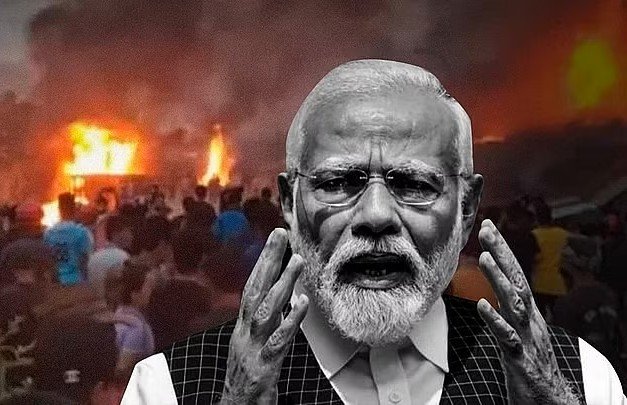In a significant diplomatic breakthrough, the Central government has successfully negotiated a revised Suspension of Operations (SoO) agreement with Kuki-Zo groups in Manipur, marking a crucial step toward restoring peace in the violence-torn northeastern state. However, this progress faces potential disruption as the United Naga Council announces a trade embargo starting September 8, creating fresh challenges ahead of Prime Minister Narendra Modi’s anticipated visit to Manipur on September 13.

Historic SoO Agreement Renewed with Stricter Terms
The tripartite agreement signed on September 4, 2025, between the Ministry of Home Affairs, Manipur government, and 24 Kuki-Zo insurgent groups under the Kuki National Organisation (KNO) and United People’s Front (UPF) umbrellas represents a major policy shift toward peace building in the region. This marks the first renewal of the SoO pact since it was kept in abeyance in February 2024 following allegations of militant involvement in ethnic violence.
The revised agreement introduces unprecedented monitoring mechanisms, including physical verification of all cadres, mandatory Aadhaar-linked bank accounts for stipend payments, and relocation of designated camps away from highways, populated areas, and the Myanmar border. These measures address long-standing security concerns while maintaining the constitutional framework that ensures Manipur’s territorial integrity remains intact.
Highway Reopening Signals Return to Normalcy
In a parallel development that could significantly impact daily life in Manipur, the Kuki-Zo Council has agreed to restore free movement along National Highway-02, the state’s primary lifeline for essential goods and commuter traffic. This decision, reached after intensive negotiations with the Ministry of Home Affairs in New Delhi, ends a two-year restriction that had severely impacted inter-community movement and economic activity.
The highway reopening demonstrates the practical benefits of diplomatic engagement, as it directly addresses the humanitarian concerns of ordinary citizens who have faced severe hardships due to the ethnic divide that has persisted since violence erupted in May 2023. Security forces have received strict instructions to ensure safe passage for all communities while maintaining vigilance against potential troublemakers.
Naga Community Launches Trade Embargo Over Border Fencing
Despite progress with Kuki groups, the Centre faces a fresh challenge as the United Naga Council announces a comprehensive trade embargo across all Naga-inhabited areas of Manipur, effective from midnight September 8. This embargo targets National Highways NH-2 and NH-37, which serve as crucial supply routes for essential commodities entering Manipur from neighboring states, particularly Assam.
The protest stems from the Central government’s decision to scrap the Free Movement Regime (FMR) with Myanmar and accelerate border fencing construction along the India-Myanmar boundary. Naga organizations argue that these measures violate indigenous rights and sever traditional cultural ties that have existed for generations across the artificial border created during British colonial rule.
The timing of this embargo creates a delicate situation for the Prime Minister’s visit, as it could disrupt supply chains and create logistical challenges for the planned events in Imphal and Churachandpur districts. The embargo particularly affects Senapati, Ukhrul, Chandel, Tamenglong, Kamjong, and Noney districts, where Naga communities form the majority population.
Strategic Context of PM Modi’s First Manipur Visit
Prime Minister Modi’s scheduled visit on September 13 carries immense political significance as his first trip to Manipur since ethnic violence began over two years ago. The visit aims to demonstrate the Central government’s commitment to restoring peace and development in the strategically important border state, which has remained under President’s Rule since February 2025.
The timing coincides with broader regional developments, including the inauguration of the 51.38-kilometer Bairabi-Sairang railway line in neighboring Mizoram, showcasing the government’s Act East Policy initiatives. Security preparations have intensified across multiple districts, with Churachandpur declared a no-drone zone and comprehensive arrangements made for events at Kangla in Imphal and Peace Ground in Churachandpur.
Complex Ethnic Dynamics and Security Challenges
The current situation reflects the complex multi-ethnic dynamics that characterize Manipur’s political landscape. While progress with Kuki-Zo groups demonstrates the effectiveness of sustained dialogue and compromise, the Naga community’s concerns highlight the interconnected nature of regional security issues, particularly those involving cross-border relationships with Myanmar.
The Free Movement Regime controversy underscores deeper questions about balancing national security imperatives with indigenous rights and traditional cross-border relationships. The 1,643-kilometer India-Myanmar border has historically allowed ethnic communities to maintain family and cultural connections across what they view as an artificially imposed international boundary.
Border Security and Immigration Concerns
Central to these negotiations are fundamental questions about border management and immigration control. The government’s decision to fence the Myanmar border and restrict the Free Movement Regime responds to legitimate security concerns, including drug trafficking, arms smuggling, and illegal immigration that have plagued the region for decades.
However, indigenous communities argue that these measures disproportionately impact their traditional way of life and fail to account for historical relationships that predate modern nation-state boundaries. The challenge lies in developing policies that address security concerns while respecting indigenous rights and cultural practices.
Economic Implications and Development Prospects
The successful negotiation of the SoO agreement and highway reopening creates opportunities for renewed economic development in Manipur. The restoration of free movement along NH-02 particularly benefits businesses and traders who have faced severe constraints during the period of ethnic division.
However, the Naga trade embargo threatens to disrupt these positive developments, potentially affecting supply chains for essential goods and creating hardships for ordinary citizens. The embargo’s impact on the agricultural sector, which depends on timely movement of products to markets, could have lasting consequences for rural livelihoods.
Path Forward and Long-term Solutions
The current developments highlight both the possibilities and limitations of piecemeal approaches to conflict resolution in ethnically diverse regions. While the SoO agreement represents significant progress, achieving lasting peace requires addressing the underlying grievances of all communities, including concerns about cultural preservation, political representation, and economic opportunities.
The government’s challenge lies in developing comprehensive policies that balance competing interests while maintaining constitutional principles and national security requirements. This includes finding ways to accommodate legitimate indigenous concerns about cross-border relationships while preventing the misuse of porous borders by criminal and militant elements.
Success in Manipur could serve as a model for conflict resolution in other parts of India’s northeast, where similar ethnic tensions and cross-border issues persist. However, failure to address the Naga community’s concerns could undermine the progress achieved with Kuki groups and create new cycles of instability.
Conclusion
As Prime Minister Modi prepares for his historic visit to Manipur, the state stands at a critical juncture between conflict and peace. The successful negotiation of the SoO agreement demonstrates that sustained dialogue and compromise can yield positive results, even in seemingly intractable conflicts.
However, the emergence of the Naga trade embargo serves as a reminder that achieving comprehensive peace in multi-ethnic societies requires addressing the concerns of all stakeholders. The government’s ability to navigate these complex challenges while maintaining its security objectives will determine whether this moment becomes a turning point toward lasting stability or merely another chapter in the region’s troubled history.
The coming days will test the effectiveness of India’s federal system in managing ethnic diversity and regional aspirations within the framework of national unity and constitutional governance.





